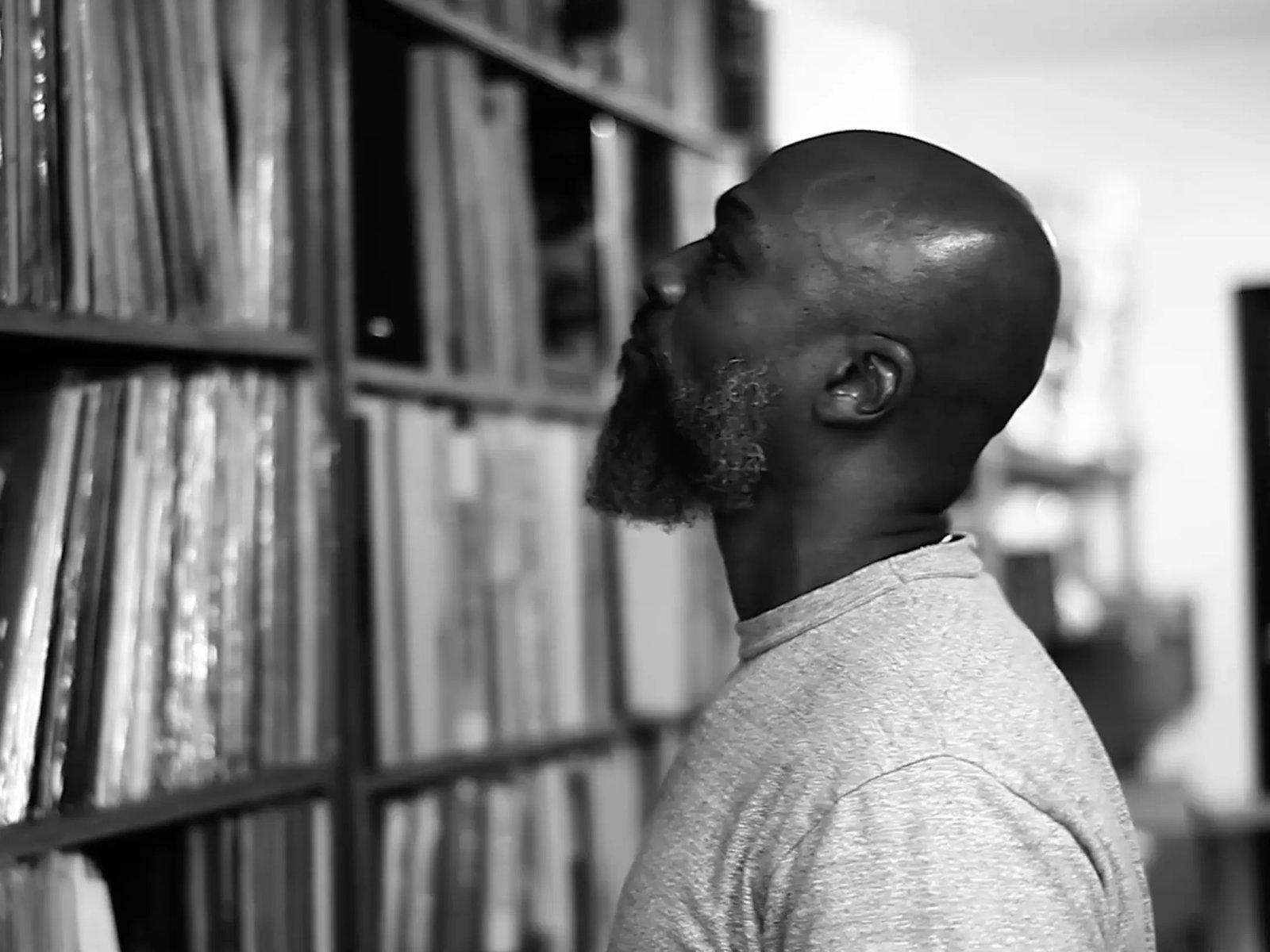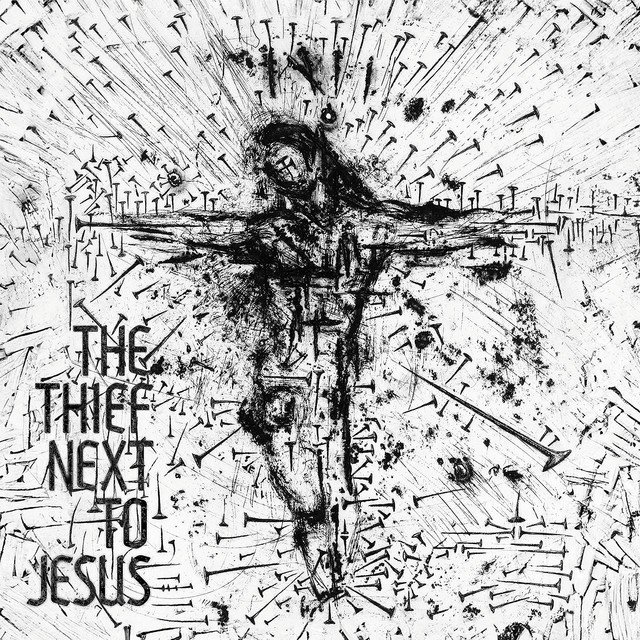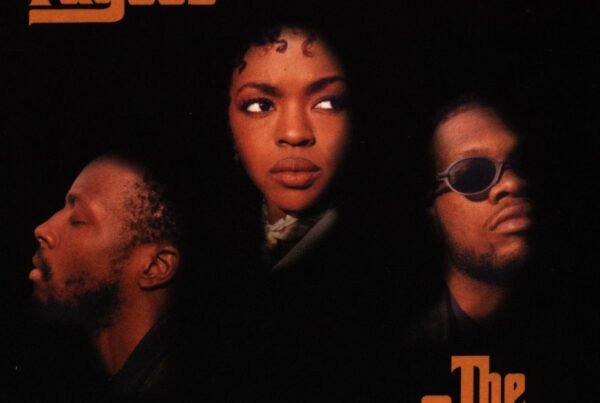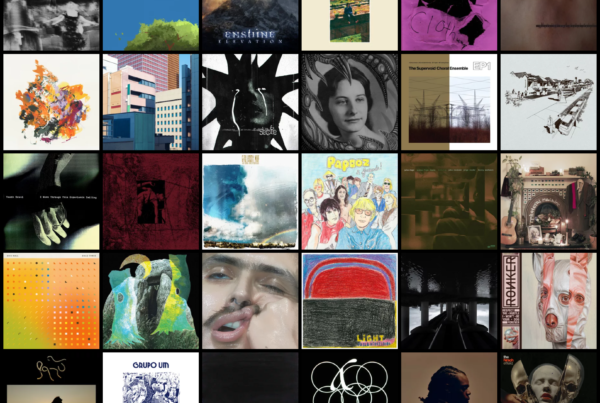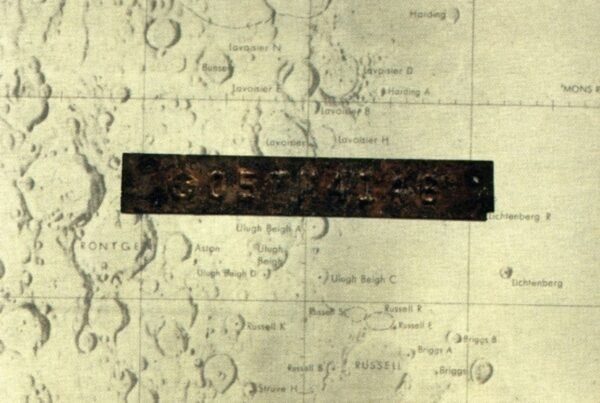These always go so fast each year, but they’re fun to do. If you missed them, here’s Part One and Part Two. That rhymed. I’ll keep this short because, thanks to me, this MF is long. Part Three of this year’s Missed Connections covers some delightful and cradling indie rock, synapse-blasting gothic gangbang chiptune metal, and one of the best rappers to ever grip a mic.
Vetiver Lowrey Ball
My missed connection with Camera Obscura goes way further back than May of this year, when the Scottish band released Look to the East, Look to the West and I spent the month trying and failing to write a review for DIIV’s Frog in Boiling Water. Because thinking back over the last decade of my life —from the end of high school, through college and up to the uncertain present— I can see Camera Obscura as a constant, fringe presence in my life. I would hear their name in conversations about favorite bands; their album covers became etched into my mind after countless encounters in my friends’ Instagram stories; and I know, deep in my heart, that their songs must have sounded from speakers at parties or during car-rides where I was a bit too dissociated to latch on to the words or the tune. But as I started working at a new café during an exhausting heat wave that gripped Mexico City for what seemed like an eternity in late spring, Look to the East was one of my favorite companions during that new beginning, whether I was riding my bike, feeling the breeze on my skin, or suffocating in the overcrowded subway, and we gleefully made up for lost time.
The album is enthralling from the very start, as a bright guitar chord ushers in a mid-tempo electric drumbeat, a deep, gentle bass line, and soft keys to kick things off on “Liberty Print”, a standout among standouts. Shifting from the intro to the song’s main section, a steady rhythm section anchors Tracyanne Campbell’s voice as the guitar and keys craft noodly textures, before ending the song in the same sweet manner as it began. So much of what is deeply endearing about the record is on full display in its first five minutes, and I go back to it whenever I’m in need of a quick dose: Tracyanne’s perfect mastery of tenderness allows for the sweet, bright and rich sounds of her voice and the band’s instruments to seamlessly envelop the heartfelt and honest words of joy, pain, longing, care, reassurance, and love that she sings.
Throughout the album’s 11 songs, enchanting moments come fast and hit hard, be it a particularly catchy melody like the chorus of the delightful “Pop Goes Pop”, a devastating emotional moment like the last lines of the piano ballad “Sugar Almond”, or a good ol’ showing of instrumental prowess, like the back-to-back guitar and piano solos on “The Light Nights”. And so Look to the East, Look to the West is blessed with this hypnotic charm that demands attention and presence. It can manifest in quite joyous ways, like going for a walk and spending the whole time miming the drums, or the bass, or the keys, and it can also be quite a solemn experience. Having gone through a devastating breakup this year, this album, the first by the band since the passing of their keyboardist Casey Lander in 2015, has gifted me with a soft haven where I can hold space for another’s grief and let my own seep out while cry-singing over a hot bowl of vegetable soup. I’m glad you’re back, Camera Obscura.
Robert Miklos
I just love it when several things I love come together and create something far better than I could’ve ever imagined. While it may sound strange to some people that church music inspired pipe organ grandiose and chiptune metal eccentricity would make a good pair, you’ll just have to trust me on this, it’s unbelievably good. To me at least, it’s just one of those things which when I see on paper, I just know there’s almost no way you can mess it up so it’s surely as good in practice. It’s already established that I’m a fan of MASTER BOOT RECORD, but even more so of the adjacent side project Keygen Church. While fully enamored with the previous offering from Keygen Church, I was always left wanting, even if it was more of a tiny whim than an actual complaint, although I could never really pinpoint what exactly would be missing.
During one of my listening sessions, I just thought to myself that, ‘Hey, this shit would be a million times more amazing if someone slapped a fuck off sized choir on top and crank everything up to 11!’. You can only imagine my delight and surprise when I heard that a new Keygen Church record is on the way sometime at the end of last year/start of this year. You, however, can’t imagine my excitement once I heard the first single off Nel Nome Del Codice. Not only were the arrangements more epic than ever and more neatly structured, but Vittorio D’Amore, absolute champ, slapped a fuck off sized choir on top. “La Chiave Del Mio Amor” just blew my mind. I obviously hit repeat on it like I was being paid my weight in gold to do so.
Little did I know that said single would be essentially the best track on the record, at least in my opinion. Though, in a way, I think it’s an incredibly based move to drop the hottest banger from your upcoming album as the first single. However, that’s not something that could really undercut the rest of the record in any shape or form. The rest of Nel Nome Del Codice quite easily lives up to set bar. It’s 55 minutes of some of the best damn music released this year. Though I do have to say I have an incredibly strong affinity for anything that’s operating at this level of balls-to-the-wall epic. Especially when it comes to choirs and pipe organs. I would probably listen to a fleet of blaring ambulances with chainsaws bolted to them if you put any of that on top of it.
Also, I’m aware that calling Nel Nome Del Codice one of the best albums of the year is a very strong statement, given that it doesn’t really redefine anything, or bring something new to the table. I just feel that it’s a very good mix of elements, executed extremely well, alongside the moods it swings through its runtime. There are parts that could legit pass as music that can be played in a giant gothic cathedral, while others would be more at home as the sonic backdrop to some kind of Bloodborne style game, with the rest blaring fittingly at an all metal festival.
The highly dynamic nature of the record keeps it as a fun listen, with lots of tasteful bits for fans of every side of it. Though I would be remiss if I wouldn’t also call attention to the narrative flair of it, besides its versatility. In my view, each song tells some kind of story, which can and will change its course every time you relisten. I never know what it can be and my imagination always surprises me once I unfurl its chains to run amok, guided solely by the tunes. There isn’t much else I can say in the name of the code, other than to spread it further.
David Rodriguez
This is a review, eulogy, and an apology all in one. It won’t be especially great at any of them, but hopefully good enough to show my love for Ka, one of the best rappers to ever walk the earth, and, maybe, urge you to dive into the vast discography he’s put out over his life starting with his most recent LP.
Kaseem Ryan died on October 12, 2024. Ka, however, lives eternally. He made sure of that with the body of work he produced having truly timeless qualities, touching on topics that persist to this day and likely will much longer cradled in epic concepts, basing his music in a much revered sound among heads like me, and ensuring his words were always understood, not because they were simplistic or basic, but because he speaks with ruthless conviction and wisdom beyond many of our imaginations. Dude cannot be touched. Decades from now, there will be knowledge to mine from Ka‘s bars by younger generations. On “We Hurting” from 2022’s Woeful Studies album, he raps ‘for them to appreciate my verse/I’m the type that gotta die first‘ – I fear he was correct in this statement.
While his music always played with the idea of death and loss, and almost prophetically of his own, no album embodied that more than The Thief Next to Jesus, and not just because it came out two months before he died. Ka was a private man, something hard to achieve in the era of social media and parasocial stans who seek to know every last thing in a war for data and knowledge when it comes to their faves, privacy be damned. We will never know how he died – we should never know how he died – but with this album, he leaves some astute and precise final thoughts that border on eerie within this context.
One of the album’s standouts, “Borrowed Time”, is quite literally about this, the chorus bargaining ‘hope it’s borrowed time when my time come,’ with the outro adding ”cause all my time wasn’t kind, son‘ to it. The feeling is monochromatic as Ka dissects aspects of his life from a macro level in a manner befitting of poetry – redundant I guess, many would say rap already qualifies as poetry. But there’s an exorbitant weight to Ka‘s words, and it’s what makes the themes of this album so dense.
The Thief Next to Jesus, besides being a striking title on its own, refers to many things. Literally, Jesus Christ communed with and assisted outcasts, thieves, sex workers, the ill, poor, and more who were looked down upon by society, specifically the ruling class. The allegory should be apparent if you even know the basics of modern society, class structure, race, and the intersections of all of those things as they play out on city streets. More relevantly to Ka himself, you could see him as the thief next to Jesus, contending with the contradictions of religion, the capital-C Church, and the Black community who have, as Ka infers many times on the album, been pacified and led astray by it to some degree (I feel the same way about our devout Catholic Latin and Hispanic communities). Ka may not be deified or exalted in any sense other than artistically, but you feel the acute struggle of a Christ-like figure seeking to do good in a world that has done him anything but in every bar of every song, his voice weathered without becoming jaded, the content of his character showing in what he spoke.
Because even as Ka reflects on his 50-plus years of long, arduous, but humbly prosperous life on The Thief Next to Jesus, he has words of encouragement and kindness for his community. “Beautiful” does that thing where rappers rap their words, but let a sample finish their bars or fill them in. Ever since Cam’ron and Juelz Santana dropped “Oh Boy” in 2002, I’ve loved that dynamic as it seems like rappers use the beat as a writing prompt to form their words and still impress – here, Ka uses that to pour affirmations and knowledge darts from his head and heart:
‘Givin’ back to the poor, that’s what you call (Beautiful)
Some are gorgeous, but they inner quarters ain’t (Beautiful)
When I part, they grieve, pray the mark I leave (Beautiful)
Can end quick, treasure friendship, ’cause it’s (Beautiful)’
For a day job (not his calling, he made that very clear in interviews), Ka was a fire captain in New York City, a first responder actually worthy of their station, reputation, and funding. He made a career out of his desire to help and his closeness to community for 25(!) years, nearly half his age, even being a responder during 9/11 not even two years on the job. The state of rap and younger generations genuinely concerned him as he shows on “Bread Wine Body Blood”. He laments how reality is specifically reflected and vices encouraged through some rap music, likening the themes to four important ‘elements’ of Christian worship with bread (money), wine (drugs in general), body (sex), blood (violence), and how they misguide the youth.
To me, it’s less scolding and more genuine concern, laced with empathy and warning to see the bigger picture of self-sabotage (‘It’s a shared struggle that we all go through/Don’t be the weapon they use to harm you‘) as much as it is an outright declaration against it all, because he’s seen it all and doesn’t want anyone else to fall for the same trap. The last four bars of the track are especially heady, a plea to redirect the energy and anger toward corrupt power and not each other, a sentiment I very much cosign in general:
‘Had enough of every tussle, seein’ muscles, where the brains at?
You wanna hurt, those that do us dirt should be the aim, black
FBI and Klan kills your leaders, when y’all gon’ pay ’em back?
If that’s how we move, then I’m smooth, y’all can stay intact’
Analyzing Ka‘s work is so intimidating, not in the sense of the puzzle-solving mindset you may have to get into to decipher some more mercurial and abstract emcees like Lupe Fiasco or billy woods, but where you don’t want to miss a single morsel of wisdom that Ka glazes each work in. Every review, especially this one, should be viewed as ‘incomplete’ in that sense as it’s near impossible to cover everything without constructing a long-form, exhaustive article that honestly wouldn’t be very appealing to read except for the diehards. It’s partly why I haven’t made the effort to talk about Ka‘s work like this until now. I always bigged him up in talks about rap and music – I’ve been a fan since 2016’s Honor Killed the Samurai after all – but couldn’t bring myself to give him his flowers on a bigger scale while he was alive.
For that, I’m full of regret, but mentally I return to that one line from “Beautiful” about praying the mark he leaves is beautiful. All I can say to that is I haven’t seen fans of rap and his peers more mournful for anyone else in the culture than when news of Ka‘s death broke. Grown men weeping, torn down by the news – I’ve personally teared up a few times when I think about it enough, including when writing this very piece. It was all love all the time, sharing favorite songs and lines, his profound drumless production style that fit his philosophically neo-noir tone (The Thief Next to Jesus is entirely self-produced as is most of his other work), and what he represented in the greater picture of hip-hop. He was inspiring beyond all others, from his concise indie operation of selling his own albums digitally through his own website and partially eschewing streaming services, to how he conducted himself as a person.
Ka represented the absolute best of hip-hop and humanity. 2024 is a year that all of us as fans of the music and culture should have reflected on our place in it, what we get out of it, and what we give back to it. My place is fanatically tenuous, meaning I absolutely love it, but I do not have a large say in moving or speaking on the culture itself because I lack the expertise and experience to give weight to anything I could say. But I also have the respect and self-awareness of that place. I put shine on and support the stuff I like, don’t talk down about stuff I don’t like, and always seek to move with positive intent within hip-hop’s outer edge. With awe, I watch people like Ka – who are very few and far in between – defend their community and add to it as much if not more than they take from it. It’s a template for all of us to borrow from in our own ways, because when it came down to it, Ka wasn’t just a once-in-a-generation artist, he was human like the rest of us.
